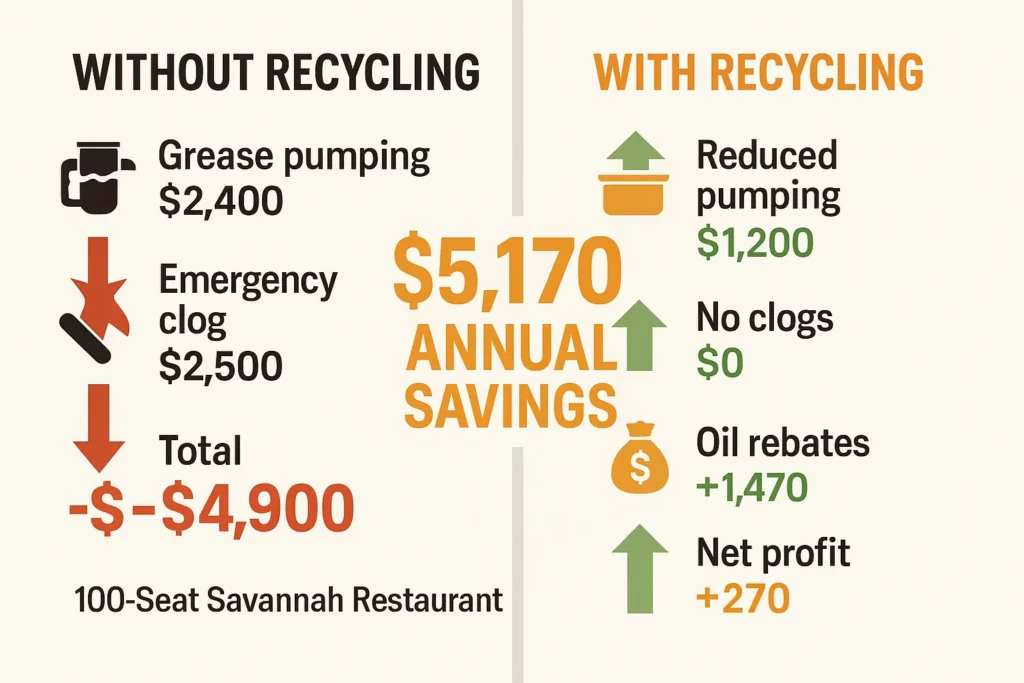Savannah, GA kitchens already separate glass, cardboard, and compost. The hidden goldmine is fryer oil: a Metro area restaurant that recycles just 140 gallons a month can clear more than $3,000 a year in rebates and avoided plumbing headaches while staying clear of (up to) $25 k per day water pollution fines. Below is the complete, story driven breakdown your finance team can run with today.
The Savannah, GA fryer that paid for itself
Midtown Bistro once paid $400 every two months for 1,000 gal grease trap pumping. After switching to monthly oil collection, they receive $0.35 /gal on 140 gallons, offsetting one quarterly pump out and saving $1,600 a year.
The chef thought “recycling is green, not profitable” until the first rebate deposit arrived. Biodiesel demand has kept rebate bands in the $0.20 to $0.50 range since 2025, mirroring Houston UCO spot prices.
How rebate math really works
Savannah, GA collectors quote by gallon, not pound. With current $0.25 to $0.50 /gal rates, a quick service location producing 4.5 gal/day the national QSR average earns $41 to $82 a month.
Because containers and pickups are free, every cent flows to the bottom line. Volume bonuses kick in above 250 gal/month, common for food halls and hotel kitchens. Local buyers funnel that oil into renewable diesel refiners eager for low carbon feedstock, propping up price floors even when crude slips.
Grease trap and plumbing savings you can bank
- Regular recycling keeps solids out of traps, stretching clean out cycles from monthly to quarterly. Each avoided pump out is roughly $400 for a 1,000 gal trap; emergency overflows cost $5 k+ once downtime and rush fees are tallied.
- Savannah, GA plumbers quote $300 to $1,600 for a single sewer line clog, while burst repairs climb past $5,000.
- In our case study, Midtown Bistro eliminated two pump outs and one late night clog in 12 months, saving $2,500 beyond rebates.

Compliance: the $25,000 a day elephant
Under Georgia’s pretreatment rules, discharging oil can trigger local re inspection fees ($100 per trap) and civil penalties. Persistent violators run into federal Clean Water Act fines up to $25 k per day.
Illegal dumping stories still surface in Buckhead, usually ending with shut off notices from the Department of Watershed Management. Recycling provides the manifest trail inspectors want and keeps FOG layers below the 25 % rule.
Insurance blind spots few owners spot
Standard commercial property policies routinely exclude sewer backup losses; payouts require a special rider most restaurateurs don’t carry.
Avoidable backups can tank claims altogether, leaving operators to fund five figure restoration bills. By keeping traps clean and logs current, recycling programs supply the paperwork insurers demand to prove “reasonable maintenance.”
Why rebate checks are rising: biodiesel economics
- Clean fuel mandates pushed U.S. biodiesel and renewable diesel consumption past 5 billion gallons in 2024.
- Every gallon needs about 9.4 lb of UCO. Spot Houston prices hit $0.52/lb in February 2025, lifting Southern rebate offers.
- Savannah, GA’s strategic rail links to Gulf Coast refineries make local collections especially valuable, keeping hauler competition and therefore rebate rates high.
ROI snapshot for a 100 seat Savannah, GA restaurant
| Annual line item | Cost without recycling | Cost with recycling | Net swing |
|---|---|---|---|
| Grease trap pumping (6×) | $2,400 | $1,200 | +$1,200 |
| Emergency clog (1×) | $2,500 | $0 | +$2,500 |
| Oil rebate income | $0 | $1,470 | +$1,470 |
| 12 month impact | –$4,900 | +$270 | $5,170 better |
Action checklist (grab and go for managers)
- Audit your volume. Log fryer dumps for one week to estimate gallons. Berkeley research places casual dining averages at 26 gal/month, but QSRs routinely triple that.
- Get three local bids. Ask for per gallon rebate, container type, and manifest format.
- Sync with your plumber. Show them the new pick up schedule to extend trap intervals.
- File manifests. Keep 36 months on site to satisfy Savannah, GA FOG inspectors.
- Review insurance riders. Confirm sewer backup coverage or add it before storm season.
Bottom line
Recycling isn’t just the right thing it’s the profitable, compliant, and insurable play for every Savannah, GA kitchen. Book our used cooking oil disposal services and watch your fryer turn from expense to asset.









